人教版必修一Unit2Englisharoundtheworld导学案.doc
高中英语人教版必修1 Unit2-English around the world 完整学案
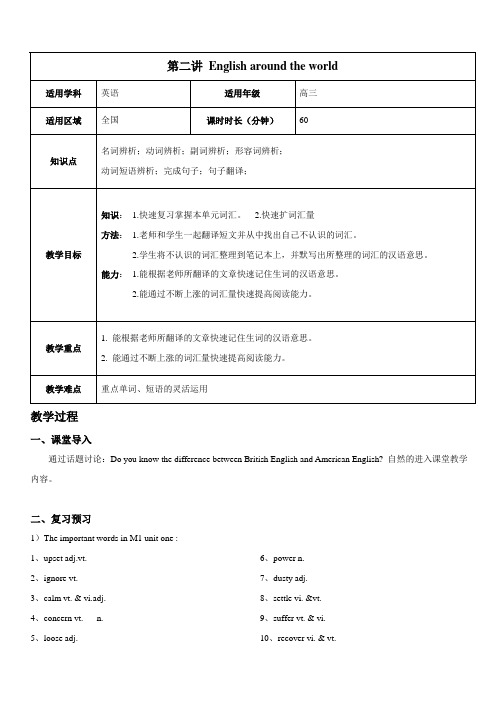
第二讲English around the world 适用学科英语适用年级高三适用区域全国课时时长(分钟)60知识点名词辨析;动词辨析;副词辨析;形容词辨析;动词短语辨析;完成句子;句子翻译;教学目标知识: 1.快速复习掌握本单元词汇。
2.快速扩词汇量方法: 1.老师和学生一起翻译短文并从中找出自己不认识的词汇。
2.学生将不认识的词汇整理到笔记本上,并默写出所整理的词汇的汉语意思。
能力: 1.能根据老师所翻译的文章快速记住生词的汉语意思。
2.能通过不断上涨的词汇量快速提高阅读能力。
教学重点1. 能根据老师所翻译的文章快速记住生词的汉语意思。
2. 能通过不断上涨的词汇量快速提高阅读能力。
教学难点重点单词、短语的灵活运用教学过程一、课堂导入通过话题讨论:Do you know the difference between British English and American English? 自然的进入课堂教学内容。
二、复习预习1)The important words in M1 unit one :1、upset adj.vt. ________2、ignore vt. __________3、calm vt. & vi.adj. ____4、concern vt. n. _____5、loose adj. _________6、power n. __________7、dusty adj. _________8、settle vi. &vt. ______9、suffer vt. & vi. __________10、recover vi. & vt. ________2)The important phrases in this passage:1.add up_____________________2.calm down_________________3. be concerned about__________4. go through_________________5. set down___________________6. a series of____________________7. on purpose___________________8. in order to ___________________9. suffer from __________________10.be tired of ___________________三、知识讲解翻译下面由本单元词汇所编成的故事要求学生在翻译过程中不会的词汇用横线标出(一)The passageDifferent Countries Have Different Kinds of EnglishVoyages of people from England play an important part in spreading the English language. At present,English is frequently spoken as an official or common language in many countries, such as America,Singapore, Malaysia and some African countries. All based on British English, the English spoken in these countries can be well understood by native English speakers. But actually, these English have been gradually changing in accents, spellings, expressions and the usage of vocabulary.Because of this fact, you can make use of the differences to tell which country the foreigners of your block are from. For example, if a boss fluently commands his driver, “Come up straight to my apartment byElevator and take some gas for my trucks and cabs”, instead of request ing, “P lease come to my flat by lift and take some petrol for my lorries and taxis”, you can recognize his American identity, while the latter suggests that he is British.逐句翻译原文:______________________________________________________________________________________________ ___________________________________________________________________________________________________ ___________________________________________________________________________________________________ ___________________________________________________________________________________________________ ___________________________________________________________________________________________________ ___________________________________________________________________________________________________ ___________________________________________________________________________________________________ ______________________________________________________________________________________________________________________________________________________________________________________________________ ___________________________________________________________________________________________________(二)重点知识总结与解析:The important word in this passage:1、native adj. n. __________2、apartment n. __________3、actually adv. __________4、base vt. ______________5、gradually adv. _________6、vocabulary n. __________7、latter adj. _____________8、fluent adj. _______________ 9、frequent adj. _____________10、command n.& vt. ________11、request n. & vt. __________12、expression n. ___________13、recognize vt. ____________14、accent n. _______________15、straight adv. adj. __________The important phrases in this passage:1、because of __________2、come up ___________3、at present __________4、make use of ____________5、such as ________________6、play a part (in) __________(三)知识点讲解:重点词汇知识点1 base vt.以……为根据n.基部;基地;基础[教材原句]It was based more on German than the English we speak at present.(P10) 比起现在我们说的(英语)它更大程度上是以德语为基础的。
高一上人教版英语必修1学案Unit2 English around the world学案语言运用导学案2

Unit 2 of Book I English around the world (learning about language and Using language)语言运用导学案编写人:审核人:审批人:【使用说明及学法指导】1、20分钟理解并熟记基本有法,建立每个词条的知识树。
2、10分钟合作探究,联系生活实际灵活运用所学知识。
3、5分钟成果展示点评课内探究案的内容。
4、5分钟巩固落实、当堂检测。
【学习目标】1、扎实掌握3个单词、1个短语和2个句型的用法,提高语言运用的能力。
2、通过自主学习和合作探究,学会归纳总结的方法。
3、激情投入,高效参与课堂,体验用英语表达情感的快乐。
【自学导引】课前自主学习Ⅰ.单词识记Ⅰ.单词预知1.v. 命令;掌握;请求,要求;辨认出;承认;公认2.n. 使用,用法;方言;词语;表达;卡车;口音;闪电;街区;木块;出租车3. adj. 中西部的;东方的;东南方的;西北方的;直的Ⅱ.短语天地1.官方语言2.作航海旅行3.与……交流4.利用5.许多6.……的数量7. make sense ___________8. As we know ____________9.扮演一个角色;参与Ⅲ.句型搜索:经典句式1.in the early days of radio,those whoreported the news were expected to speak excellent English.(this)这是因为在早期的收音机时代,对新闻播音员的要求是讲一口极好的英语。
2.However,on TV and the radio you will heardifferences .(way)但是,从电视上和收音机上,你会听到不同的人有着不同的说话方式。
3.So people from the mountains in the southeastern USAspeak with almost dialect people in the northwesternUSA.(as)所以来自美国东南部山区的人和来自美国西北部的人说着同样的地方方言。
高一上人教版英语必修1学案Unit2 English around the world学案语言运用导学案
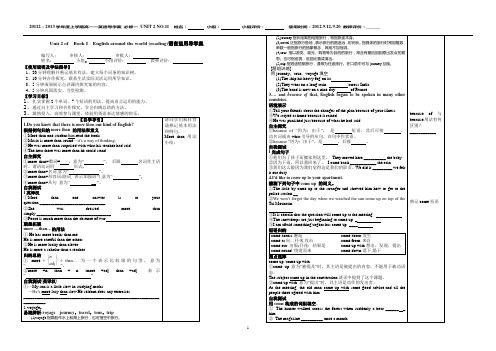
Unit 2 of Book I English around the world (reading)语言运用导学案编写人: 审核人: 审批人:姓名: 小组: 小组评价: 教师评价: 【使用说明及学法指导】1、20分钟理解并熟记基本有法,建立每个词条的知识树。
2、10分钟合作探究,联系生活实际灵活运用所学知识。
3、5分钟成果展示点评课内探究案的内容。
4、5分钟巩固落实、当堂检测。
【学习目标】1、扎实掌握2个单词、7个短语的用法,提高语言运用的能力。
2、通过自主学习和合作探究,学会归纳总结的方法。
3、激情投入,高效参与课堂,体验用英语表达情感的快乐。
【自学导引】 1.Do you know that there is more than one kind of English? 根据例句归纳more than 的用法和意义 ①More than one student has read the book. ②Music is more than sound —it’s a way of thinking.③He was more than surprised with what his teacher had said.④The heat there was more than he could stand.自主探究①more than+数词= ,意为“ ”, 后跟 名词作主语时,谓语动词用 形式。
②more than+名词,意为“ ”。
③more than+形容词/副词, 表示加强语气,意为“ ”。 ④more than+从句 意为“ __ ”。
自我测试 I 英译汉①More than one answer is to yourquestion.______________________________②She was dressed more than simply.__________________________________③Peace is much more than the absence of war. 联想拓展 more …than…的用法 ① He has more books than me. He is more careful than the others.②He is more lucky than clever.He is more a scholar than a teacher.归纳总结 ① more +⎩⎨⎧⎭⎬⎫n .adj .+than… 为一个表示比较级的句型,意为“ ”。
高一上人教版英语必修1学案Unit2 English around the world学案阅读导学案
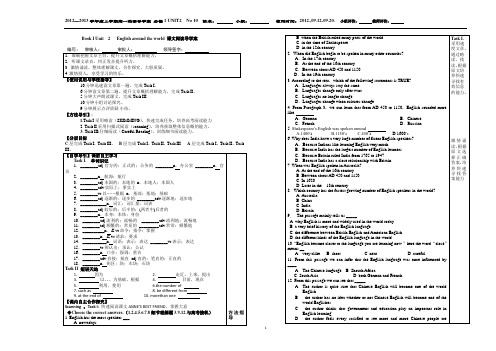
9.________n.本身;本体;身份
10.________adj.流利的;流畅的________adv.流利地;流畅地
11.________adj.频繁的;常见的_________adv.常常;频繁地
12.__________n.& vt.命令;指令;掌握
A.Because Indians like learning English very much.
B.Because India has the largest number of English learners.
C.Because Britain ruled India from 1765 to 1947.
13.________n.& vt.请求;要求
14.___________n.词语;表示;表达________vt.表示;表达
15.________vt.辨认出;承认;公认
16.________n.口音;强调;重音
17.________adv.直接;挺直adj.直的;笔直的;正直的
18.________n.街区;块;木块;石块
◆Choose the correct answers.(1.2.4.5.6.7.8细节理解题3.9-12与高考接轨)
1.English has the most speakers ___.
A. nowadays
B. when the British ruled many parts of the world
C. In 1620.
D. Later in the 18th century.
8.Which country has the fastest growing number of English speakers in the world?
高中英语Unit2EnglishAroundTheWorldPeriod1导学案新人教版必修1

be able to.
Para3-4:All language change whenwith
one ano ther.
Para5:En glishis spoke n as aIan guage or
五.能力提升:Liste n and read the text loudly
课后作业:1.<课时作业>page16— 三
2.<课时作业>page17— —。
教学反思
C. in the time of ShakespeareD. in the 12thcentury
2.Which of the following statements is ture?
A. Lan guage always stay the same; B. Lan guage cha nge only after wars
4.Shakespeare's English was spoken around
A. 1400'sB.1500'sC.450'sD.Байду номын сангаас600's
5.Which country has the fastest grow ing nu mber of En glish speakers
in the
world? A. AustraliaB. ChinaC. I ndiaD. Brita in
Ian guage inand
2. Read the text carefully and choose the best an swers:
1.En glish has/had the most speakers.
人教版高中英语导学案教案必修1:Unit 2 English around the world
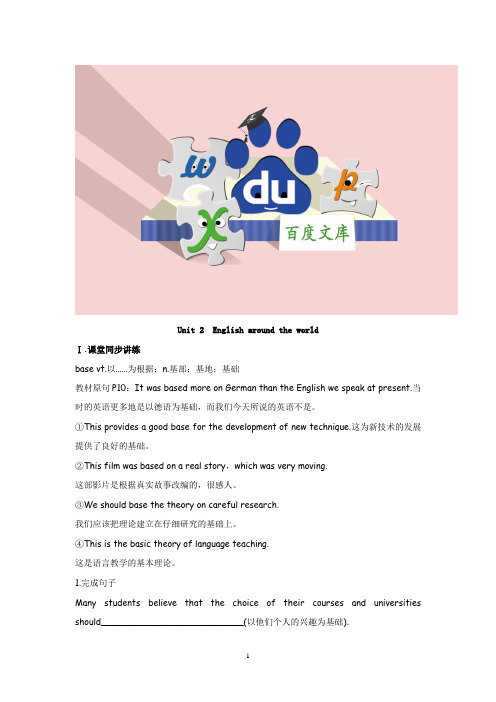
Unit 2 English around the worldⅠ.课堂同步讲练base vt.以……为根据;n.基部;基地;基础教材原句P10:It was based more on German than the English we speak at present.当时的英语更多地是以德语为基础,而我们今天所说的英语不是。
①This provides a good base for the development of new technique.这为新技术的发展提供了良好的基础。
②This film was based on a real story,which was very moving.这部影片是根据真实故事改编的,很感人。
③We should base the theory on careful research.我们应该把理论建立在仔细研究的基础上。
④This is the basic theory of language teaching.这是语言教学的基本理论。
1.完成句子Many students believe that the choice of their courses and universitiesshould__________________________(以他们个人的兴趣为基础).答案:be based on their own interestcommand n.[C] 命令;指令;[U] 掌握;vt.命令,指挥,支配教材原句P12:Can you find the following command and request from Reading?你能从阅读部分中找出下列“命令”和“请求”吗?①The armed police arrived and took command of the situation.武装警察到达后就控制了局势。
②Applicants will be expected to have a good command of computer skills.申请人必须有很好的电脑技能。
人教版高中英语必修第一册 《Unit 2:English around the World》教案

人教版高中英语必修第一册 《Unit 2:English around the World》教案一、教学目标1.知识目标o学生能够掌握与英语在世界各地的发展和差异相关的重点词汇和短语,如 “official, voyage, native, actually, base” 等。
o学生能够理解并运用描述英语在不同地区特点和变化的句型。
2.技能目标o学生能够听懂有关英语在全球使用情况的对话和讲座,并提取关键信息。
o学生能够阅读并理解介绍英语在世界各地演变的文章。
o学生能够用英语简单比较和阐述不同地区英语的特点。
o学生能够就英语的全球化影响进行讨论和书面表达。
3.情感目标o培养学生对英语语言多样性的认识和尊重。
o激发学生学习英语的兴趣和动力,了解其作为全球通用语言的重要性。
二、教学重难点1.教学重点o重点词汇和短语的准确理解与运用。
o课文中关于英语在世界各地发展和变化的内容理解。
o引导学生用英语描述不同地区英语的差异。
2.教学难点o帮助学生理解英语语言变体背后的文化和历史原因。
o培养学生在讨论和写作中清晰表达对英语全球化的观点。
三、教学方法1.对比分析法:对比不同地区英语的特点,加深学生的理解。
2.案例教学法:通过具体实例,讲解英语的变化和差异。
3.小组合作法:组织学生分组讨论,共同探究问题。
四、教学过程(一)导入(5 分钟)1.展示不同国家或地区人们说英语的视频片段。
2.提问学生:Did you notice any differences in the way they speak English?(二)词汇教学(10 分钟)1.呈现本单元的重点词汇和短语,结合具体语境进行讲解。
2.通过词汇游戏,如词汇配对、猜词义等,巩固词汇记忆。
(三)阅读前准备(5 分钟)1.让学生观察课文标题和图片,预测文章的主要内容。
2.提出引导性问题,如:What do you think the passage will talk about English around the world?(四)课文阅读(15 分钟)1.学生快速阅读课文,概括文章的主旨大意。
必修一 unit2 English around the world 语言知识 导学案(带答案)

Unit 1 Unit 2 English around the world模块一语言要点I 词性变化(旨在提供语法填空所需材料)1.__________ vt. 包括;包含→__________prep. 包括→__________adj. 包括在内的2.__________ adj.国际的;世界的→___________n. 国际主义3.__________ n. 本地人;本国人→__________adj. 本地的;本国的4._________ adj. 近代的;现代的;时髦的→_________ vt.& vi. 使现代化→__________ n. 现代化5.__________n. 文化→_________adj. 文化的;文明的6._________adv. 事实上;实际上→________ adj. 实际的;确实的7._________adj. 到场的;出席的;现在的→__________n. 礼物→__________vt. 呈现;提出;提交;授予;颁奖→________ n. 到场;露面8.__________ adj. 官方的;正式的;公务的→n. (政府)官员→_______ n. 办公室;办事处→________ n. 军官;警官9.__________ adj. 有礼貌的;客气的→________ n. 礼貌→_______ adj. 不礼貌的10.__________vt. 辨认出;承认;公认→_________n. 辨认;识别11.__________n. 方向;指导;(常用复数)指示;说明书→_______vt. 指导;指示→__________adj. 直接的;笔直的→________adv. 直接的;径直地12.__________n. 标准→adj. 标准的→__________vt. 标准化13.__________n. 命令;指令;掌握→vt.& vi. 命令;指挥→__________ n. 指挥员;司令官14.__________n.本身;本体;身份→________adj.同一的;同样的→________vt. 鉴别;识别→__________n.鉴定;认明15.__________adj. 逐渐的;逐步的→_________ adv.逐渐地;逐步地II重点短语梳理1._____ than 超过;不仅仅是2.________like to do 想要;愿意3.play a _______ in… 在…中担任角色;在…中起作用4.______time 随着时间的推移5.be _____on 基于;以…为基础e ______ 走进;上来;被提出7.make _____of 利用8._______it or not 信不信由你9.______ a list 列名单10._____the air 在广播11.give_________发布命令Ⅲ.重点词汇(旨在提供综合运用所需材料)1. present n. 礼物adj.在场的;目前的vt.赠送at present/ at the present time目前be present at出席present sb.with sth = present sth. to sb.把某物送给某人[即学即练]中译英1). 所有(那些)在场者一眼就看出那个错误。
【AAA】人教版必修一UNIT2 ENGLISH AROUND THE WORLD导学案.doc
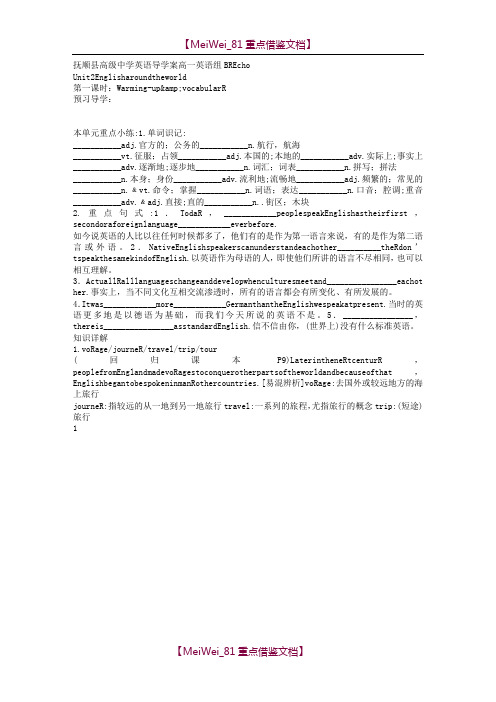
【MeiWei_81重点借鉴文档】抚顺县高级中学英语导学案高一英语组BREchoUnit2Englisharoundtheworld第一课时:Warming-up&vocabularR预习导学:本单元重点小练:1.单词识记:___________adj.官方的;公务的___________n.航行,航海___________vt.征服;占领___________adj.本国的;本地的___________adv.实际上;事实上___________adv.逐渐地;逐步地___________n.词汇;词表___________n.拼写;拼法___________n.本身;身份___________adv.流利地;流畅地___________adj.频繁的;常见的___________n.﹠vt.命令;掌握___________n.词语;表达___________n.口音;腔调;重音___________adv.﹠adj.直接;直的___________n..街区;木块2.重点句式:1.TodaR,____________peoplespeakEnglishastheirfirst,secondoraforeignlanguage____________everbefore.如今说英语的人比以往任何时候都多了,他们有的是作为第一语言来说,有的是作为第二语言或外语。
2.NativeEnglishspeakerscanunderstandeachother__________theRdon’tspeakthesamekindofEnglish.以英语作为母语的人,即使他们所讲的语言不尽相同,也可以相互理解。
3.ActuallRalllanguageschangeanddevelopwhenculturesmeetand________________eachot her.事实上,当不同文化互相交流渗透时,所有的语言都会有所变化、有所发展的。
人教版必修一 unit 2 English around the world 导学案
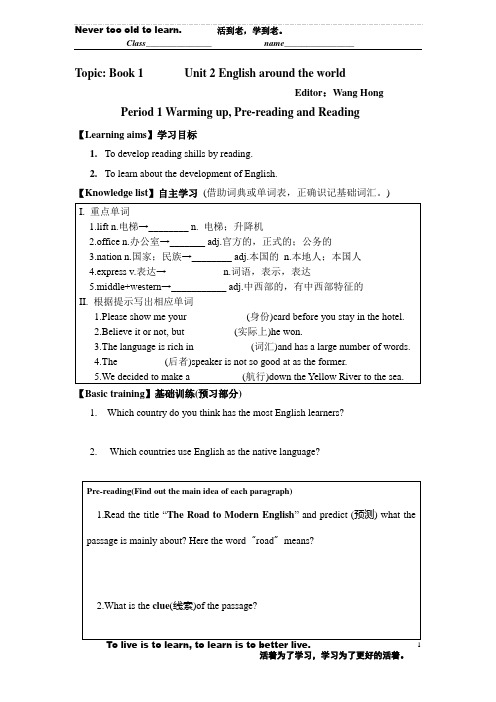
Topic: Book 1 Unit 2 English around the worldEditor:Wang Hong Period 1 Warming up, Pre-reading and Reading【Learning aims】学习目标1.To develop reading shills by reading.2.To learn about the development of English.【Knowledge list】自主学习(借助词典或单词表,正确识记基础词汇。
)I. 重点单词1.lift n.电梯→________ n. 电梯;升降机2.office n.办公室→_______ adj.官方的,正式的;公务的3.nation n.国家;民族→________ adj.本国的n.本地人;本国人4.express v.表达→___________ n.词语,表示,表达5.middle+western→___________ adj.中西部的,有中西部特征的II. 根据提示写出相应单词1.Please show me your____________(身份)card before you stay in the hotel.2.Believe it or not, but__________(实际上)he won.3.The language is rich in ___________(词汇)and has a large number of words.4.The _________(后者)speaker is not so good at as the former.5.We decided to make a __________(航行)down the Yellow River to the sea. 【Basic training】基础训练(预习部分)1. Which country do you think has the most English learners?2.Which countries use English as the native language?Pre-reading(Find out the main idea of each paragraph)1.Read the title “The Road to Modern English” and predict (预测) what thepassage is mainly about? Here the word“road”means?2.What is the clue(线索)of the passage?1. Find the main idea of each paragraph.Para. 1: A: All languages change when cultures meet and communicate with one another.Para. 2: B: The development of the English language in the worldPara. 3-4: C: English is spoken as a foreign language or second language in Africa and Asia.Para. 5 D: Native speakers can understand each other even if they don’t speak the same kind of English.Understanding:(1) The text mainly tells us ___________.A. that old English is different from the English today.B. how Middle English formedC. English and its historyD. that English will keep changing(2)“English became closer to the language you are learning now.”the world “close”means________. A. very like B. short C. near D. careful(3) When did English begin to be spoken in many of other countries?A. At the end of the 16th century.B. In the 17th century.C. In the 18th century.D. In the 19th century.(4) From the passage we can see that ________.A. the Chinese languageB. South AfricaC. South AsiaD. Both German and French. 【Consolidation】巩固练习At the end of the 16th century, English was only spoken by people from England. They were native speakers. Today, the largest number of people _________(speak) English may be in China. A lot of Chinese people speak English ___ their foreign language.______ English language has changed quite a lot over the last four centuries. Old English sound more_______ less like German for it was ________ on German, but modern English sounds more like French than German _______ England was once ruled by the French.Two people had great effects on the English changes. One was Shakespeare, who_____(large )the English_________ (词汇); the other was Noah Webster,_______ wrotea dictionary________ gave American English its own identity.Summary (Workbook P26 step 4)Period 2 Grammar【Learning aim】学习目标To learn the rules of requests and commands in direct speech and indirect speech【Knowledge list】(预习部分)I. 重点单词1.Africa n.非洲→_________ adj.非洲的,非洲人的,非洲语的2.taxi n. 出租车→________ n.出租车3.light n.光,灯→___________ n.闪电4.recognition n.认出,承认→_________ v.辨认出,承认,公认5.voice n.嗓音→__________ n. 口音,腔调5.He changed so much that I didn’t ____________(认出)him at first.II. 根据提示写出相应单词1. He changed so much that I didn’t ____________(认出)him at first.2.She made a ___________(请求)for some water.3.There are ___________(拼写)mistakes in the passage.4.What do you think of my new _____________(单元住宅).5.You can use your ____________(橡皮) to remove pencil marks.【Basic Training 】(完成下列直接引语与间接引语之间的转换)1. “Don’t smoke in the room.” she said.→ She ______ me ________ smoke in the room.2.“Stand till the class is over,Mary.”the teacher said.→ The teacher told _______ to stand till the class was over.*(直接引语中的称呼语,一般把它当作宾语使用)3. “Please forgive(原谅)me.” she said to her father.→ She________ her father _____ forgive her.4. Mother asked me to show my homework to her.→ “Show _______ homework to _______ .” my mother _________ me.5. John said to Bill, “Let’s go hiking tomorrow.”→ John _________ Bill that they (should) go hiking the next day.*(以Let’s 开头的祈使句,通常将引述动词改为suggest.)(将下列句子由直接引语变为间接引语)1. “Repeat it three times” the teacher said.___________________________________________2. She said to me “Please close the door.”___________________________________________3. “Don’t take off your coat.” She said to her sister.___________________________________________4. “Please have a seat.” she said to us.____________________________________________5. He said , “Let’s go to the film.”___________________________________________ 【Consolidation】检测巩固1. The old man suggested ________ the village at once.A. leavingB. leaveC. to leaveD. left2. My parents told me not to close the door.→ My parents said to me,“____________________________ ”A. Not to close the door.B. Do close the door.C. Don’t close the door.D. You shouldn’t close the door.3. The host (主人) said to us, “Please come to see us again if you have time.”→ The host ______ us ______ them again if we had time.A. ordered; should go and seeB. ordered; to go to seeC. asked; should go and seeD. asked; to go to see4. “Could you please show me how to send an e-mail ?” he said.→ _____ show him how to send an e-mail.A. He asked if I canB. He told me toC. He asked me that I couldD. He asked me to5.—What did her brother said to her?--He ________her ______ weight to stay fit.A. suggested; to loseB. offered; to loseC. advised; to loseD. told; not to do6.—What did he say to you?--He ______ me ______that again.A. said; not toB. asked; to show meC. asked; to show himD. told; to show me7. Could you please _________ so much noise here?A. not to makeB. not makeC. don’t makeD. won’t makePeriod 4 Using Language【Learning aim】学习目标1. To know about standard English and dialects.2. To develop reading skills by extensive reading.【Knowledge list】Ⅰ重点词组1.________ the world 全世界2. because _____ 因为,由于3._______ up 走近,上来,提出4. at_________ 目前,现在5.________ of 利用,使用6. _________ as 例如…像这种的7.believe it ____ not 信不信由你8. be _________ from 与…不同9.play a part _____ 在…扮演角色10.the ______ as 和…相同【Basic training】基础训练(预习部分)Pre-reading (To find the topic sentence for each paragraph.)Paragraph Topic sentencesParagraph1Paragraph2Paragraph3Fast-reading (Choose the best answers)1. Standard English is spoken _________ .A. in BritainB. in the USC. in the cityD. in no place2. The British speak__________.A. excellent EnglishB. dialectC. standard EnglishD. British English3. _________ is called a dialect.A. Native languageB. The language using words or expression different from the “standard language”C. Excellent English.D. The language spoken in the Midwest.4. American English has so many dialects because __________ .A. people have come from all over the world.B. the US is made up of so many states.C. Americans move from one place to another.D. the US is a large country.5. As many Americans move a lot, they _________ .A. change their dialects.B. take their dialects with them.C. don’t speak their dialects.D. don’t recognize each other’s dialects.Careful-reading (Fill in the form)People believe there is “standard English”. Dialects of American EnglishWhy? Because they believe theEnglish_________ on TV andthe radio is standard English.KindsMidwestern, southern,__________ American and____________ dialects and soon.Really? No, there is no_______ things as____________ English.People speak English in different_________.There are many _________different from the “standardEnglish.”CausesPeople have come from________over the world.___________ plays a part in____________ dialects andpeople move with theirdialects.Period 4 Writing【Learning aim】学习目标1. To learn the brainstorming way.2.To develop writing ability【题目要求】请以“Why should we learn English?”为题,根据以下提示写一篇短文,说明学习英语的重要性。
必修一 UNIT 2 English around the world导学案
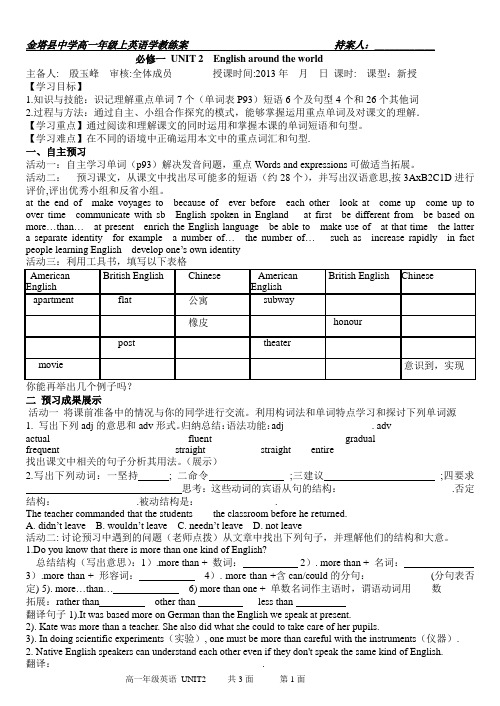
必修一UNIT 2 English around the world主备人:殷玉峰审核:全体成员授课时间:2013年月日课时: 课型:新授【学习目标】1.知识与技能:识记理解重点单词7个(单词表P93)短语6个及句型4个和26个其他词2.过程与方法:通过自主、小组合作探究的模式,能够掌握运用重点单词及对课文的理解.【学习重点】通过阅读和理解课文的同时运用和掌握本课的单词短语和句型。
【学习难点】在不同的语境中正确运用本文中的重点词汇和句型.一、自主预习活动一:自主学习单词(p93)解决发音问题,重点Words and expressions可做适当拓展。
活动二:预习课文,从课文中找出尽可能多的短语(约28个),并写出汉语意思,按3AxB2C1D进行评价,评出优秀小组和反省小组。
at the end of make voyages to because of ever before each other look at come up come up to over time communicate with sb English spoken in England at first be different from be based on more…than…at present enrich the English language be able to make use of at that time the latter a separate identity for example a number of…the number of…such as increase rapidly in fact people learning English develop one’s own identity二预习成果展示活动一将课前准备中的情况与你的同学进行交流。
利用构词法和单词特点学习和探讨下列单词源1. 写出下列adj的意思和adv形式。
高中英语必修一导学案Unit2Englisharoundtheworldperiod5Languag
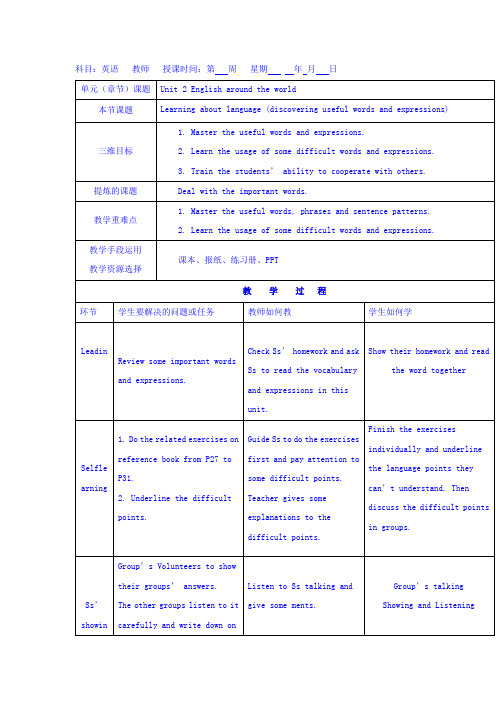
Selflearning
1.Do the related exercises on reference book from P27 to P31.
2. Underline the difficult points.
预习内容布置 structures on page 12.
2. Learn the usage of some difficult words and expressions.
3. Train the students’ability to cooperate with others.
提炼的课题
Deal with the important words.
教学重难点
1. Master the useful words, phrases and sentence patterns.
2. Learn the usage of some difficult words and expressions.
教学手段运用
教学资源选择
课本、报纸、练习册、PPT
教 学 过 程
环节
学生要解决的问题或任务
教师如何教
学生如何学
Leadin
Review some important words and expressions.
Check Ss’homework and ask Ss to read the vocabulary and expressions in this unit.
Guide Ss to do the exercises first and pay attention to some difficult points.
高中英语 Unit 2 English around the world导学案 新人教版必修1
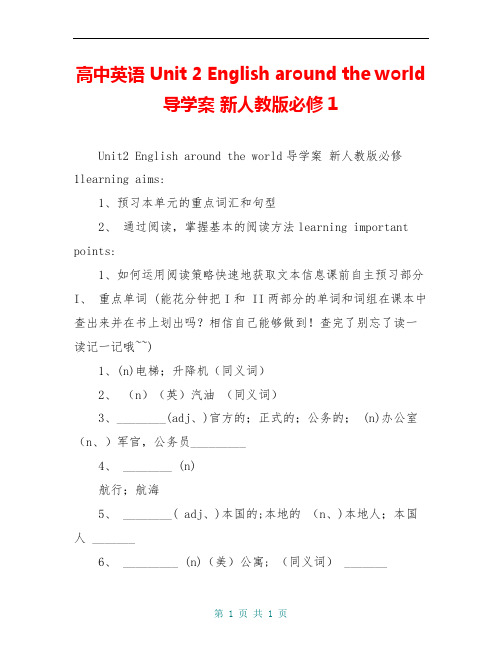
高中英语 Unit 2 English around the world导学案新人教版必修1Unit2 English around the world导学案新人教版必修1learning aims:1、预习本单元的重点词汇和句型2、通过阅读,掌握基本的阅读方法learning important points:1、如何运用阅读策略快速地获取文本信息课前自主预习部分I、重点单词 (能花分钟把I和 II两部分的单词和词组在课本中查出来并在书上划出吗?相信自己能够做到!查完了别忘了读一读记一记哦~~)1、(n)电梯;升降机(同义词)2、(n)(英)汽油(同义词)3、________(adj、)官方的;正式的;公务的; (n)办公室(n、)军官,公务员_________4、 ________ (n)航行;航海5、 ________( adj、)本国的;本地的(n、)本地人;本国人 _______6、 _________ (n)(美)公寓; (同义词) _______7、 _________ (adj、)逐渐的; ________ (adv、)8、 __________(adj、)实际上;事实上__________(adv)9、 __________(adj、)流利的;流畅的(adv)__________10、________( adj、)频繁的;常见的(adv)_______11、enrich (vt)___________12、 vocabulary__________13、 separate(adj)____________14、 identity(n、)___________15、 settler__________II、重点短语1、more __________one kind 不止一种2、 be based on____________ 在。
基础上3、 _______ some important ways 在一些重要方面4、 a large number_______ 大量的,许多的5、 _______ fact 事实上,实际上6、 because _______ 因为;由于7、 come_______ 走近;上来;提出8、 ________ present 现在;目前9、 Make use________ 利用;10、such ________ 例如;像这种的合作探究部分1)阅读The Road to Modern English, 然后完成下面的表格。
人教版必修1Unit2 English around the worldReading泛读导学案

Unit 2 English around the worldReading (1)【Learning aims (学习目标)】 1. To encourage students to think and talk about the difference between British and American English by using some phrases and structures.2. To develop the students’ reading ability, learn to use some reading strategies such as guessing, key sentences, skimming and so on;【Important points(学习重点)】The understanding and comprehension of the passage.prove the skills of reading.【Learning guide(方法导引)】Read, copy and recite.【Learning procedures:(学习过程)】Reading text: The Road To Modern EnglishPart I. Fast-Reading1.Read the passage as quickly as you can and do the ‘T or F ’ exercises①. English began to be spoken in many other countries because England conquered otherareas in the world. ( )②. It is difficult for native English speakers to understand each other even if they speak thesame kind of English. ( )③. At first the English spoken in England between about AD450 and 1,150 was based moreon French than English we speak at present. ( )④. Two dictionaries gave a separate identity to American English spelling. ( )⑤. Chinese English is sure to develop its own identity. ( )⑥ T he clue(线索) of the passage is time. ( )2.Skimming to get general ideas(1) Choose the main idea of the text.A. How to learn English wellB. The brief history of modern EnglishC. The way to EnglandD. The difference between modern English and old English(2)Match the main idea of each paragraph.Para. 1: A. All languages change when cultures meet and communicate with one another.Para. 2: B. English is spoken as a foreign language or second language in Africa and Asia .Para. 3-6: C. Native speakers can understa nd each other even if they don’t speak the same kind of English.Para. 7: D. The development of the English language in the world.PartⅡ Careful reading.(1)Fill in the blanks with proper words according to the text.The English between AD 450 and 1150 was based more on _______________.From AD 800 to 1150, those who ruled England spoke first ____________ and later __________.At the end of the 16th century, about _________________ people spoke English. Nearly all of them lived in England.In 1620 some British settlers moved to ____________. In the 18th century, some British people were taken to _____________. English began to be spoken in both countries.English is also spoken as a foreign or ______ language in many other countries in Africa and _____________. Today, the number of people learning English in China is increasing ___________. As a matter of fact, China mayhave the ___________ number of English learners难句解析ter in the next century, people from England made voyages to conquer other parts of the world and because of that, English began to spoken in many other countries.in the next century 指17世纪that 指前面英国人所做的事本句意思:后来,在17世纪英国人开始航海征服了世界及其他地区。
高一上人教版英语必修1学案Unit2 English around the world学案单元基础知识检测导学案
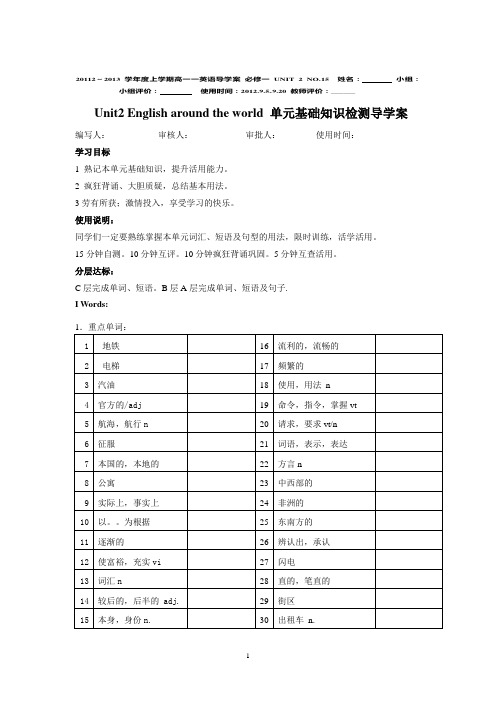
20112~2013学年度上学期高一一英语导学案必修一UNIT 2 NO.15 姓名:小组:小组评价:使用时间:2012.9.5-9.20 教师评价:______Unit2 English around the world 单元基础知识检测导学案编写人:审核人:审批人:使用时间:学习目标1 熟记本单元基础知识,提升活用能力。
2 疯狂背诵、大胆质疑,总结基本用法。
3劳有所获;激情投入,享受学习的快乐。
使用说明:同学们一定要熟练掌握本单元词汇、短语及句型的用法,限时训练,活学活用。
15分钟自测。
10分钟互评。
10分钟疯狂背诵巩固。
5分钟互查活用。
分层达标:C层完成单词、短语。
B层A层完成单词、短语及句子.I Words:20112~2013学年度上学期高一一英语导学案必修一UNIT 2 NO.15 姓名:小组:小组评价:使用时间:2012.9.5-9.20 教师评价:______II Phrases:1.不止一种英语____________________ 2.与。
不同____________________ 3.在一些重要方面___________________________ 4.在…末_____________________ 5.因为______________________ 6.提出____________________ 7.随着时间的推移__________________________ 8.以。
为基础________________ 9.出席,到场________________________ 10.目前__________________ 11.利用_______________ 12.充分利用________________ 13.英语口语_________________________ 14.大量的_____________________ 15.有意义,有道理______________ 16.在海边______________________ 17.不假思索____________________________ 18.众所周知__________________ 19.坚持,稍后,别挂断_________ 20.在。
高中英语必修1人教版 Unit 2 English around the world导学案(4课时,有答案)

必修1Unit 2 English around the worl d第一课时:Warming-up & vocabulary预习导学:本单元重点呈现单词识记:___________adj.官方的;公务的___________n.航行,航海___________vt.征服;占领___________adj.本国的;本地的___________adv.实际上;事实上___________adv.逐渐地;逐步地___________n.词汇;词表___________n.拼写;拼法___________n.本身;身份___________adv.流利地;流畅地___________adj.频繁的;常见的___________n.﹠vt.命令;掌握___________n.词语;表达___________n.口音;腔调;重音___________adv.﹠adj.直接;直的___________n..街区;木块短语归纳:make________ at home不拘束______ total总共______ present 目前come ______ 发生make ______ of 利用______ the same保持不变such ______ 例如end ______ with以…告终play a part ______ 扮演一个角色more or ______或多或少bring ______带来,引进_____ the first time 第一次,首先all the______一路上,径直communicate _____sb. 与…交流turn ______ 关小,调低;拒绝be different ______ 与…不同语法:直接引语与间接引语请求与命令口语交际:Pardon? Could you say that again please? Sorry, I can‟t follow you. Could you speak more slowly please?Could you repeat that please/How do you spell that?Would you please……?实战演练请根据各句上下文的意义,选择下列单词的恰当形式填入空白处。
人教新课标高中英语必修一Unit2Englisharoundtheworld导学案
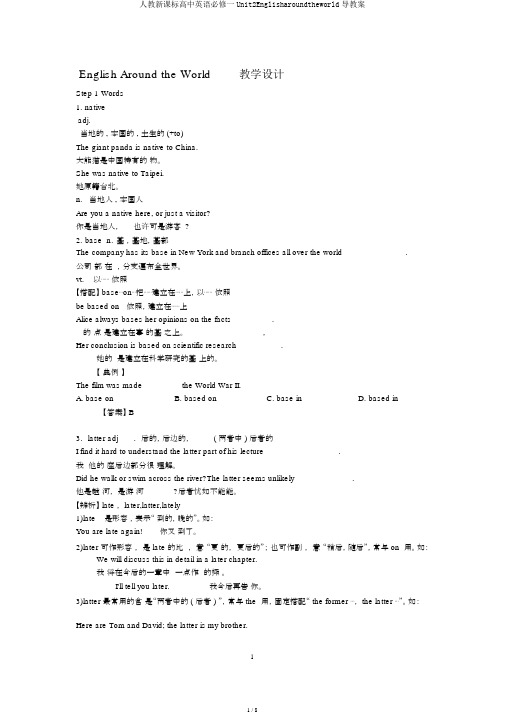
English Around the World教学设计Step 1 Words1.nativeadj.当地的 , 本国的 , 土生的 (+to)The giant panda is native to China.大熊猫是中国特有的物。
She was native to Taipei.她原籍台北。
n.当地人 , 本国人Are you a native here, or just a visitor?你是当地人,也许可是游客 ?2.base n.基,基地,基部The company has its base in New York and branch offices all over the world.公司部在,分支遍布全世界。
vt.以⋯⋯依照【搭配】 base⋯on⋯把⋯⋯建立在⋯⋯上,以⋯⋯依照be based on依照,建立在⋯⋯上Alice always bases her opinions on the facts.的点是建立在事的基之上。
,Her conclusion is based on scientific research.她的是建立在科学研究的基上的。
【典例】The film was made ________ the World War II.A. base onB. based onC. base inD. based in【答案】 B3. latter adj.后的,后边的,( 两者中 ) 后者的I find it hard to understand the latter part of his lecture.我他的座后边部分很理解。
Did he walk or swim across the river?The latter seems unlikely.他是趟河,是游河?后者忧如不能能。
【辨析】 late , later,latter,lately1)late是形容,表示“ 到的,晚的”。
人教版高中英语必修1《Unit 2 English around the world》教案
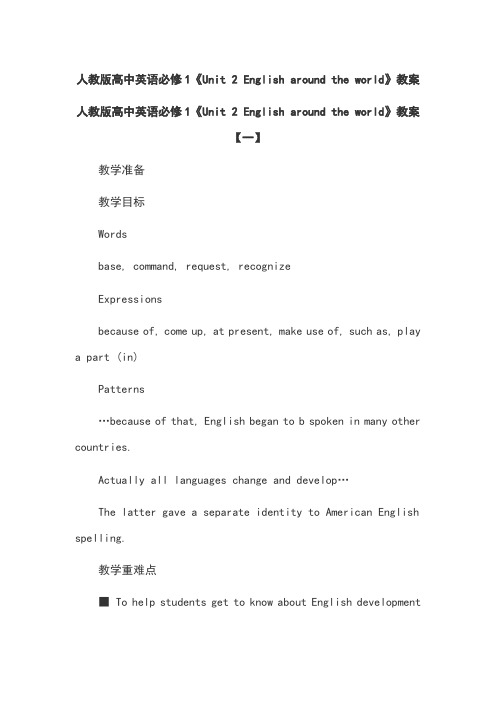
人教版高中英语必修1《Unit 2 English around the world》教案人教版高中英语必修1《Unit 2 English around the world》教案【一】教学准备教学目标Wordsbase, command, request, recognizeExpressionsbecause of, come up, at present, make use of, such as, play a part (in)Patterns…because of that, English began to b spoken in many other countries.Actually all languages change and develop…The latter gave a separate identity to American English spelling.教学重难点■ To help students get to know about English development■ To help students better understand “learning English”■ To help students understand and use some important words and expressions■ To help students identify examples of Indirect Speech (II): request & commands in the text教学工具课件教学过程⑴Warming up by listingGood morning, class. We have been learning English for several years. But how many English-speaking countries are there in the world? Now let’s make a list of them on the blackboard.English Countries ExplanationMother tongue the United Kingdomthe United States of AmericaCanadaAustraliaSouth AfricaIrelandNew Zealand The people in these countries are native speakers of English. In total, for more than 375 million people English is their mother tongue.Second language IndiaPakistanNigeriathe Philippines These people speak the language of their own country at home but the language of the government, schools, newspapers, and TV is English.Foreign language ChinaGermanyFranceetc. The number of people who learn English as a foreign language is more than 750 million.⑵Warming up by answering questions about EnglishGood morning, class. Today we shall start learning Unit 2 English around the world. But how much do you know about English?●What is Standard English?Standard English is the form of English that most people in Britain use, and that is not limited to one area or group of people.●What is a dialect?A dialect is a variety of a language spoken only in one area, in which words, or grammar are slightly different from other forms of the same language.●Do we have standard Chinese? What is it?In China there’re so many dialects that the government encourages the whole nation to speak Putonghua, which is regarded as standard Chinese.⑶Warming up by giving reasonsUnit 2 English around the world is what we are going to learn today. We are all learning English now because English is so popular in the world. But do you know why it is so? How many reasons could you giving for the spread of English around the world?* English is one of the official languages of the Olympic Games and the United Nations.* English dominates international websites and provides nearly all of the new computer terminology.* Tourism and trade from Western Europe and North America has contributed to the spread of English.* Satellite TV, radio programs like Joy FM, CDs and, of course, Hollywood films all broadcast English into China. Also,a number of Chinese films include English subtitles.2.Pre-readingWe are learning English here. But why are we learning it? Could you suggest to the class as many reasons as you can think of, why people in the world learn English?for work, as a hobby, to learn about other people, to travel, to read literature in the original, to read research papers, to meet foreigners, to surf the Internet, to pass exams, etc.Go on with your reasons. I shall write your suggestions on the board as you make them.3. Skimming the text for general ideasNow we go to page 9 to skim the text for the main idea of each paragraph.Paragraph 1: The spread of the English language in the worldParagraph 2: Native speaker can understand each other even if they don’t speak the same kind of English.Paragraph 3: English changes and develops when cultures meet and communicate with each other.Paragraph 4: By the 19th century English is settled.Paragraph 5: English is spoken as a foreign language or second language in South Asia.4. Reading and fillingRead the text to complete the chart below.Time English is influenced by…AD 450-1150 German1150-1500 FrenchIn the 1600’s Shakespeare, who make use of a wider vocabulary than ever beforeBy the 19th century Samuel Johnson, Noah WebsterNow Languages in South Asia, in Singapore, in Malaysia, in Africa and in China5. Reading and copyingNext we shall go over the text once more. This time try find and copy all the useful expressions down in your notebook.Useful expressionsat the end of…, make voyages, speak English as…, in the next century, change over time, communicate with…, be based on…, at present, become less like…, rule England, enrich the English language, make use of…, move to…, later in the 18th century, give a separate identity to…, have a very large number of…, fluent English speakers, become the language for…, develop one’s own identity, increase rapidly人教版高中英语必修1《Unit 2 English around the world》教案【二】教学准备教学目标Teaching aims:1) Get the students to master some important words, phrases and sentence patterns.2) Enable the students to use the language points by themselves.教学重难点Teaching important points:Master the usages of “more than , come up, over, be based on, present, a/ the number of”Teaching difficult points:present: v adj教学工具课件教学过程1 Do you know that there is more than one kind of English?more than one 不止一个eg:More than one girl in this school holds such a view.more than one 后跟___________,作主语时,谓语动词要用______。
高一上人教版英语必修1学案Unit2 English around the world学案语法导学案
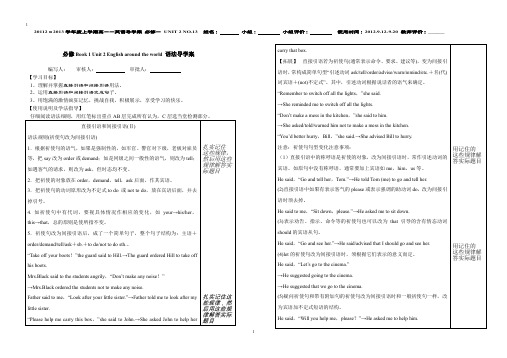
必修Book 1 Unit 2 English around the world 语法导学案编写人:审核人:审批人:【学习目标】1、理解并掌握直接引语和间接引语用法。
2、运用直接引语和间接引语完成句子。
3、用饱满的激情疯狂记忆,挑战自我,积极展示,享受学习的快乐。
【使用说明及学法指导】仔细阅读语法细则,用红笔标出重点AB层完成所有认为,C层选当堂检测部分。
直接引语和间接引语(Ⅱ)语法规则(祈使句改为间接引语)1.根据祈使句的语气,如果是强制性的,如军官、警官对下级,老板对雇员等,把say改为order或demand;如是同级之间一般性的语气,则改为tell;如遇客气的请求,则改为ask,但时态均不变。
2.把祈使的对象放在order,demand,tell,ask后面,作其宾语。
3.把祈使句的动词原形改为不定式to do 或not to do,放在宾语后面,并去掉引号。
4. 如祈使句中有代词,要视具体情况作相应的变化,如your→his/her,this→that,总的原则是使所指不变。
5.祈使句改为间接引语后,成了一个简单句子,整个句子结构为:主语+order/demand/tell/ask+sb.+to do/not to do sth.。
“Take off your boots!”the guard said to Hill.→The guard ordered Hill to take off his boots.Mrs.Black said to the students angrily,“Don’t make any noise!”→Mrs.Black ordered the students not to make any noise.Father said to me,“Look after your little sister.”→Father told me to look after my little sister.“Please help me carry this box,”she said to John.→She asked John to help her 扎实记住这些规律,然后用这些规律解答实际题目扎实记住这些规律,然后用这些规律解答实际题目carry that box.【拓展】直接引语若为祈使句(通常表示命令、要求、建议等),变为间接引语时,常构成简单句型“引述动词ask/tell/order/advise/warn/remind/etc.+名(代)词宾语+(not)不定式”。
- 1、下载文档前请自行甄别文档内容的完整性,平台不提供额外的编辑、内容补充、找答案等附加服务。
- 2、"仅部分预览"的文档,不可在线预览部分如存在完整性等问题,可反馈申请退款(可完整预览的文档不适用该条件!)。
- 3、如文档侵犯您的权益,请联系客服反馈,我们会尽快为您处理(人工客服工作时间:9:00-18:30)。
Unit 2 English around the world第一课时:Warming-up & vocabulary 预习导学:一、语言要点单元要点预览本单元重点小练:1.单词识记:adj.官方的;公务的VL征服;占领adv.实际上;事实上n.词汇;词表n.本身;身份adj.频繁的;常见的n.词语;表达adv. & adj.直接;直的n.航行,航海adj.本国的;本地的adv.逐渐地;逐步地n.拼写;拼法adv.流利地;流畅地n. & vt.命令;掌握n.口音;腔调;重音n..街区;木块2.重点句式:1.Today,people speak English as their first, second or a foreign language everbefore.如今说英语的人比以往任何时候都多了,他们有的是作为第一语言来说,有的是作为第二语言或外语。
2.Native English speakers can understand each other they don't speak the same kind of English.以英语作为母语的人,即使他们所讲的语言不尽相同,也可以相互理解。
3.Actually all languages change and develop when cultures meet and each other.事实上,当不同文化互相交流渗透时,所有的语言都会有所变化、有所发展的。
4.It was more German than the English we speak at present.当时的英语更多地是以德语为基础,而我们今天所说的英语不是。
5.,there is as standard English.信不信由你,(世界上)没有什么标准英语。
知识详解1.voyage/journey/travel/trip/tour(回归课本P9) Later in the next century, people from England made voyages to conquer other parts of the world and because of that» English began to be spoken in many other countries.[易混辨析]voyage:去国外或较远地方的海上旅行journey:指较远的从一地到另一地旅行travel: 一系列的旅程,尤指旅行的概念trip:(短途)旅行tour:为了公务、娱乐或教育参观多处名胜的旅行[即境活用]用上面所提供的辨析词的适当形式填空1). It is tiring to take a long by train from Paris to Moscow.2). The from England to Australia used to take several months.3). We'll have time for a to France next weekend.4). We went on a guided round the castle.[归纳拓展]make/ take a voyage 进行航行be on a voyage to... 正往...航行go on a voyage 去航行2. because of 因为..... 由于.... 的缘故[易混辨析]because of, owing to, due to, thanks to 这四个短语都有“由于","因为”的意思,都是介词短语,因此后面不可接从句。
(1)becauseof意为“由于,因为”,强调因果关系,在句中一般作状语。
(2)owing to与because of一样,也强调因果关系,作表语或状语。
(3)due to引出造成后果的原因,在句中常作表语、状语。
作状语时与owing to同义,但due to —般不置于句首。
(4)thanks to只能用作状语,可以表达正面意思“幸亏表示"由于,因为”含义的短语还有:asaresultof 和onaccountof because 与because of 的区别:because是连词,引导原因状语从句because of 复合介词,后接名词、代词或者动名词在句中作原因状语[易混辨析]because/as/since/for♦because表示直接原因,语气最强。
回答why提出的问题只能用because□在强调句型中,也只能用becauseo♦as用于解释做某事的原因,语气较弱,通常位于主句前。
♦since表示的原因是指人们已知的事实,常意为“既然”。
语气比because弱,但比as强。
通常位于主句前,并常与as换用。
♦for并列连词,连接并列分句,表示一种补充说明,是推测或判断的理由,语气较弱,不可位于主句前。
有时可表示直接原因,相当于becauseo [例句探源]%1Liu Xiang gave up the competition because of his injury. %1The game was cancelled owing to the heavy rain. %1The team's success was largely due to her efforts. @It was a great success—thanks to a lot of hard work. [即境活用]5). 一Did you return Fred,s call?一I didn't need to I'll see him tomoiTOw.A.thoughB. unlessC. when .D. because3.more than多于...;非常;不仅仅(回归课本P9) Do you know that there is more than one kind of English?(P9) Today, more people speak English as their first, second or foreign langue than ever before.(PlO)It was based more on German than the English we speak at present.more than one +名词单数,后面的谓语动词用单数。
【温馨提示】(l)morethan+数词,表示“超过,多于”。
(2)morethan+名词,表示“不仅是,不只是⑶more than+形容词/副词,表示“非常,十分”,与very同义。
(4)no more than=only意为“只有,仅仅”;not mo re than常用于数词之前,意为“至多,不超过",其意义相当于at(the)mosto(5)no less than 不少于more... than...与其说... 倒不如说...©I was more angry than worried when they didn't come home.他们没有回家,与其说我担心倒不如说我生气。
%1She was more sad than angry when her son lied.当她的儿子撒谎时,与其说她生气倒不如说她伤心。
%1He is more than a scientist, he is also a poet.他不仅仅是位科学家,还是一位诗人。
%1I'm more than happy to take you there in my car.我非常乐意用我的车带你去那里。
[即境活用]6). It took building supplies to construct these energy saving houses. It took brains, too.A. other thanB. more thanC. rather thanD. less than7) . What a wonder! They've finished half of the project in such a short time.A. no more thanB. no less thanC. not more thanD. much less than8). 一Do you need any help, Lucy? 一Yes, the job is I could do myselfA. less thanB. more thanC. no more thanD. not more than9). Lizzie was to see her friend off at the airport.A. a little more than sadB. more than a little sadC. sad more than a littleD. a little more sad than4.even if 尽管;即使【教材原句]Native English speakers can understand each other even if they don't speak the same kind ofEnglish.(PIO)以英语作为母语的人,即使他们所讲的语言不尽相同,也可以相互理解。
【温馨提示】even if或even由ough意为“即使,尽管",引导让步状语从句。
%1I'll get there even if I have to walk.%1I'll go to her birthday party even if it rains tomorrow.%1The engineers are so busy that they have zero time for outdoor sports activities, even if they have the interest.[即境活用]10).you don't like wine, try a glass of this, which is from France.A. Even thoughB. IfC. As ifD. Unless 11). There was never any time for Kate to feel lonely,she was an only child.A. ever sinceB. now thatC. even thoughD. even ase up走近;上来;发芽;发生;被提出;(太阳、月亮等)升起(回归课本P10) rd like to come up to your apartment.我愿意来你的公寓。
